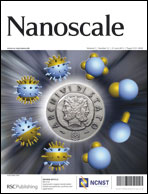Highly selective gas sensor arrays based on thermally reduced graphene oxide
Abstract
The electrical properties of reduced graphene oxide (rGO) have been previously shown to be very sensitive to surface adsorbates, thus making rGO a very promising platform for highly sensitive gas sensors. However, poor selectivity of rGO-based gas sensors remains a major problem for their practical use. In this paper, we address the selectivity problem by employing an array of rGO-based integrated sensors instead of focusing on the performance of a single sensing element. Each rGO-based device in such an array has a unique sensor response due to the irregular structure of rGO films at different levels of organization, ranging from nanoscale to macroscale. The resulting rGO-based gas sensing system could reliably recognize analytes of nearly the same chemical nature. In our experiments rGO-based sensor arrays demonstrated a high selectivity that was sufficient to discriminate between different


 Please wait while we load your content...
Please wait while we load your content...